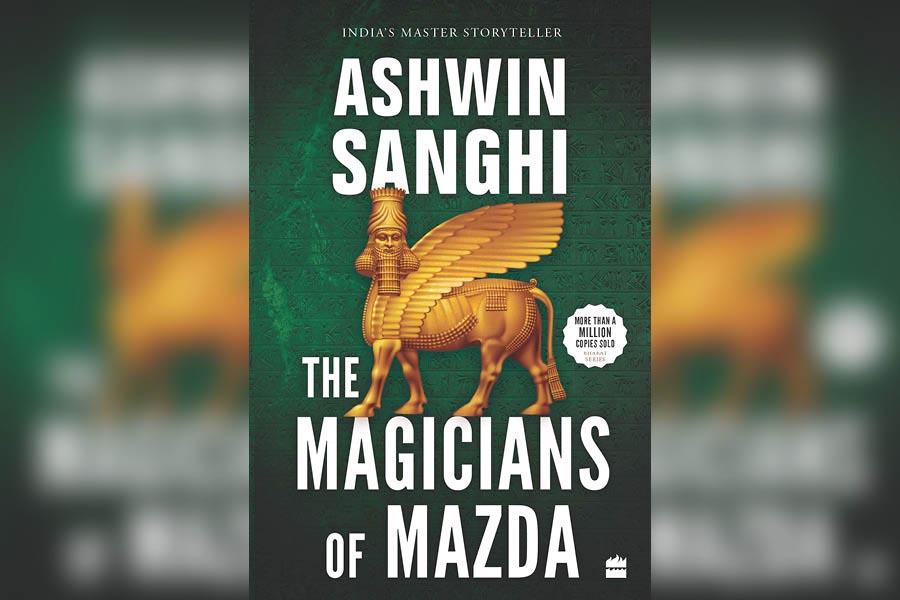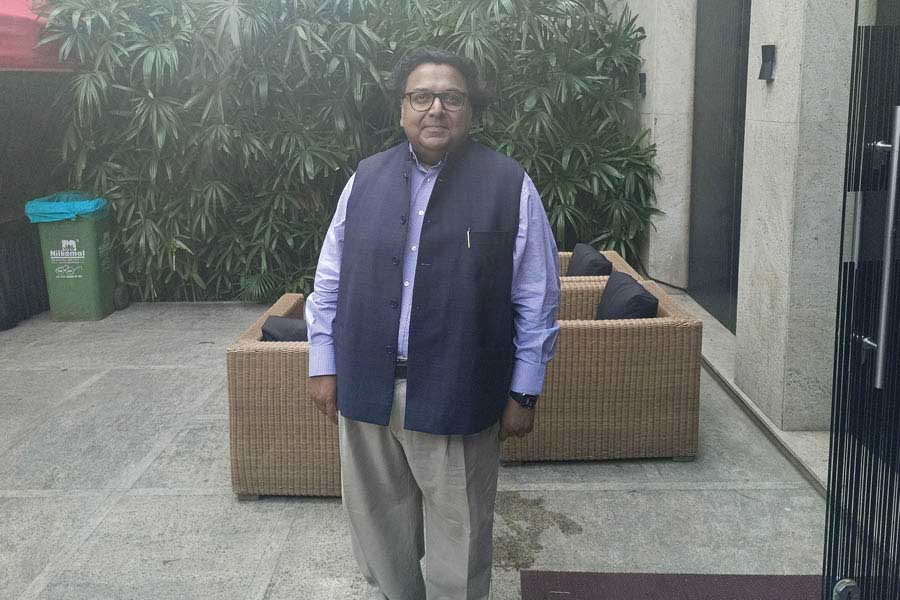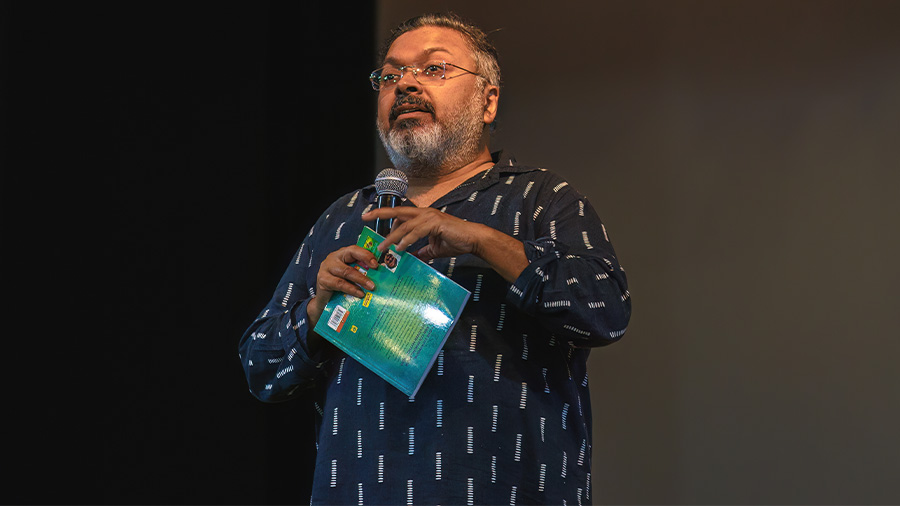Ashwin Sanghi has often been referred to as India’s answer to Dan Brown. The comparisons are as overdone as they are obvious. Much like the celebrated author of The Da Vinci Code, Sanghi’s fiction delves into religious scriptures, historical events, mythology and theology, threading together tightly woven stories that are set in contemporary times.
Yet there is a key difference between the two authors. While Brown’s books focus on European or American legends and religions, Sanghi’s stories have a distinctly Indian strain. They extrapolate on the legends of Krishna and Chanakya, the conspiracy that Jesus was buried in Kashmir, and many more.
My Kolkata chatted with Sanghi on the sidelines of the Bangalore Literature Festival about the philosophy of his books, his latest work, titled The Magicians of Mazda (2022), his writing process, upcoming projects, and more.
The idea for ‘Magicians’ came to Sanghi when he was sitting next to Boman Irani

‘The Magicians of Mazda’ is connected to the history of the Parsi community and their arrival in India Amazon
It is widely believed that the Parsis first entered India through Diu and Sanjan around 720CE. Essentially, a fleet of boats with 18,000 Parsis had fled from Persia (now Iran) to escape the Umayyad Caliphate and docked at Gujarat. They were welcomed by the local population, and soon became an affluent, cultured lot. The Magicians of Mazda revolves around this history. It is the latest instalment in Sanghi’s ‘Bharat Series’ — a set of seven novels that began with the bestseller, The Rozabal Line, in 2008. The idea for Magicians came to Sanghi when he was sitting next to the actor Boman Irani on a flight from Delhi to Mumbai. Irani had urged Sanghi to write a thriller related to Parsi history and culture.
But Sanghi’s story explores the period before the Parsis came to Gujarat. Why were they persecuted in Iran, he asks? What made them powerful in Persia before they were persecuted? And did they already have an ancient link with India’s philosophies before they landed in Diu? These are the questions Sanghi explores in Magicians.
One cannot expect straight answers from Sanghi. Certainly not answers that are 100 per cent factually accurate. Sanghi, however, was ironically honest in admitting that he often lies in his books. But, if he tells a lie, he said, “the lie must be as close to the truth as possible”. Sanghi is notorious for weaving fictional elements with historical truths with such dexterity that separating the line between them is tiresome. It seems to be the type of thriller he enjoys writing the most. “The formula is simple,” he said, “myth plus history equals mystery.”
The philosophy of the ‘Bharat Series’
The Rozabal Line was self-published under the pseudonym Shawn Haigins and republished by Westland after it sold like hot cakes. Magicians is the seventh book in this series.
Yet ‘series’ is a tricky word. For one will not find the Indian equivalent of Robert Langdon showing up in every book. The Bharat Series is not a set of fiction books with recurring characters and plotlines. The connection between the books is, instead, thematic. They extrapolate philosophical ideas that were birthed in the Indian subcontinent and have, over time, found universality in various corners of the world.
The Indian subcontinent has always been a hotbed of history and tradition-building. After all, Gautama Buddha had meditated in Bihar. The underwater legendary city of Dwarka was at the mouth of Gujarat. The Kurukshetra War was likely fought in present-day Haryana. The Rama Setu still lies submerged between Tamil Nadu and Sri Lanka. “I don’t see Bharat as a geographical region,” Sanghi said. “I see it as ideas, cultures, values and common bonds in spiritual thought and philosophy. For instance, even though my latest book talks about Persia, if you dig deeper, you’ll find Bharat there. This pattern is there in pretty much every book [of mine].”
‘While morning is about putting things on paper, evening is about taking things from paper’

Sanghi at the Bangalore Literature Festival earlier in December Neil Nagwekar
With 14 published books in a span of 15 years, it is fair to assert that Sanghi is among India’s most prolific writers. This is surprising, considering how dense most of his books can get. Almost every paragraph includes a fact (or factoid) that most readers would be unaware of.
Research is crucial to Sanghi, especially when his subject matter concerns sensitive figures like Vishnu or Mary Magdalene. He describes it as the “columns, foundations and beams” of his writing process. Once this bedrock of research is built, there still exists gaps. Those gaps are where fiction enters — his bricks and mortar. “My research process is quite mechanical,” he said. “It doesn’t sound sexy when I say that, right? Most people want writers to be lost in the moment. They want the story to control us. But this isn’t the case with me.”
Sanghi’s writing process resembles a monotonous nine-to-five gig. Even worse, perhaps. The author begins writing around 5am and stops around 9am. The research process happens in the evening, between 6pm and 10pm. “While morning is about putting things on paper, evening is about taking things from paper,” explained Sanghi, whose schedule conveys an important message regarding honing one’s literary craft: muse-like motivation is fickle, but discipline is reliable.
Sanghi also revealed that he has plans to launch a crime-thriller, signalling the start of another series. Meanwhile, the eighth instalment of the Bharat Series is likely to be released in January 2025. When asked to provide details, the author’s response was typical. “Your only clue is that it concerns events in 42CE,” he said. We speculate that this might take us to the Roman Empire. But who is to tell? The world is a vast, old thing, and Bharat’s philosophies have touched most of its corners.


